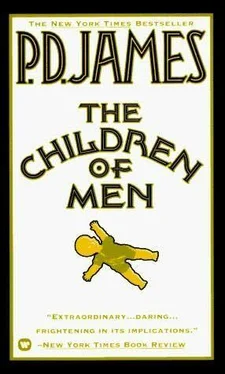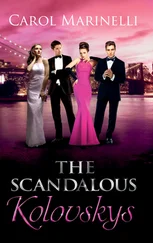In our universal bereavement, like grieving parents, we have put away all painful reminders of our loss. The children’s playgrounds in our parks have been dismantled. For the first twelve years after Omega the swings were looped up and secured, the slides and climbing frames left unpainted. Now they have finally gone and the asphalt playgrounds have been grassed over or sown with flowers like small mass graves. The toys have been burnt, except for the dolls, which have become for some half-demented women a substitute for children. The schools, long closed, have been boarded up or used as centres for adult education. The children’s books have been systematically removed from our libraries. Only on tape and records do we now hear the voices of children, only on film or on television programmes do we see the bright, moving images of the young. Some find them unbearable to watch but most feed on them as they might a drug.
The children born in the year 1995 are called Omegas. No generation has been more studied, more examined, more agonized over, more valued or more indulged. They were our hope, our promise of salvation, and they were—they still are—exceptionally beautiful. It sometimes seems that nature in her ultimate unkindness wished to emphasize what we have lost. The boys, men of twenty-five now, are strong, individualistic, intelligent and handsome as young gods. Many are also cruel, arrogant and violent, and this has been found to be true of Omegas all over the world. The dreaded gangs of the Painted Faces who drive round the countryside at night to ambush and terrorize unwary travellers are rumoured to be Omegas. It is said that when an Omega is caught he is offered immunity if he is prepared to join the State Security Police, whereas the rest of the gang, no more guilty, are sent on conviction to the Penal Colony on the Isle of Man, to which all those convicted of crimes of violence, burglary or repeated theft are now banished. But if we are unwise to drive unprotected on our crumbling secondary roads, our towns and cities are safe, crime effectively dealt with at last by a return to the deportation policy of the nineteenth century.
The female Omegas have a different beauty, classical, remote, listless, without animation or energy. They have their distinctive style which other women never copy, perhaps fear to copy. They wear their hair long and loose, their foreheads bound with braid or ribbon, plain or plaited. It is a style which suits only the classically beautiful face, with its high forehead and large, widely spaced eyes. Like their male counterparts, they seem incapable of human sympathy. Men and women, the Omegas are a race apart, indulged, propitiated, feared, regarded with a half-superstitious awe. In some countries, so we are told, they are ritually sacrificed in fertility rites resurrected after centuries of superficial civilization. I occasionally wonder what we in Europe will do if news reaches us that these burnt offerings have been accepted by the ancient gods and a live child has been born.
Perhaps we have made our Omegas what they are by our own folly; a regime which combines perpetual surveillance with total indulgence is hardly conducive to healthy development. If from infancy you treat children as gods they are liable in adulthood to act as devils. I have one vivid memory of them which remains the living icon of how I see them, how they see themselves. It was last June, a hot but unsultry day of clear light with slow-moving clouds, like wisps of muslin, moving across a high, azure sky, the air sweet and cool to the cheek, a day with none of the humid languor I associate with an Oxford summer. I was visiting a fellow academic in Christ Church and had entered under Wolsey’s wide, four-centred arch to cross Tom Quad when I saw them, a group of four female and four male Omegas elegantly displaying themselves on the stone plinth. The women, with their crimped aureoles of bright hair, their high bound brows, the contrived folds and loops of their diaphanous dresses, looked as though they had stepped down from the Pre-Raphaelite windows in the cathedral. The four males stood behind them, legs firmly apart, arms folded, gazing not at them but over their heads, seeming to assert an arrogant suzerainty over the whole quad. As I passed, the females turned on me their blank, incurious gaze, which nevertheless signalled an unmistakable flicker of contempt. The males briefly scowled, then averted their eyes as if from an object unworthy of further notice and gazed again over the quad. I thought then, as I do now, how glad I was that I no longer had to teach them.
Most of the Omegas took a first degree, but that was all; they aren’t interested in further education. The undergraduate Omegas I taught were intelligent but disruptive, ill-disciplined and bored. Their unspoken question, “What is the point of all this?,” was one I was glad I wasn’t required to answer. History, which interprets the past to understand the present and confront the future, is the least rewarding discipline for a dying species.
The university colleague who takes Omega with total calmness is Daniel Hurstfield, but then, as professor of statistical palaeontology, his mind ranges over a different dimension of time. As with the God of the old hymn, a thousand ages in his sight are like an evening gone. Sitting beside me at a college feast in the year when I was wine secretary, he said: “What are you giving us with the grouse, Faron? That should do very nicely. Sometimes I fear you are a little inclined to be too adventurous. And I hope you have established a rational drinking-up programme. It would distress me, on my deathbed, to contemplate the barbarian Omegas making free with the college cellar.”
I said: “We’re thinking about it. We’re still laying down, of course, but on a reduced scale. Some of my colleagues feel we are being too pessimistic.”
“Oh, I don’t think you can possibly be too pessimistic. I can’t think why you all seem so surprised at Omega. After all, of the four billion life forms which have existed on this planet, three billion, nine hundred and sixty million are now extinct. We don’t know why. Some by wanton extinction, some through natural catastrophe, some destroyed by meteorites and asteroids. In the light of these mass extinctions it really does seem unreasonable to suppose that Homo sapiens should be exempt. Our species will have been one of the shortest-lived of all, a mere blink, you may say, in the eye of time. Omega apart, there may well be an asteroid of sufficient size to destroy this planet on its way to us now.”
He began loudly to masticate his grouse as if the prospect afforded him the liveliest satisfaction.
During those two years when, at Xan’s invitation, I was a kind of observer-adviser at the Council meetings, it was usual for journalists to write that we had been brought up together, that we were as close as brothers. It wasn’t true. From the age of twelve we spent the summer holidays together, but that was all. The error wasn’t surprising. I half believed it myself. Even now the summer term seems in retrospect a boring concatenation of predictable days dominated by timetables, neither painful nor feared but to be endured and occasionally, briefly, enjoyed, since I was both clever and reasonably popular, until the blessed moment of release. After a couple of days at home I would be sent to Woolcombe.
Even as I write I am trying to understand what I felt for Xan then, why the bond remained so strong and for so long. It wasn’t sexual, except that in nearly all close friendships there is a subcutaneous pricking of sexual attraction. We never touched, not even, I remember, in boisterous play. There was no boisterous play—Xan hated to be touched and I early recognized and respected his invisible no-man’s-land, as he respected mine. It wasn’t, either, the usual story of the dominant partner, the elder, if only by four months, leading the younger, his admiring disciple. He never made me feel inferior; that wasn’t his way. He welcomed me without particular warmth but as if he were receiving back his twin, a part of himself. He had charm, of course; he still has. Charm is often despised but I can never see why. No one has it who isn’t capable of genuinely liking others, at least at the actual moment of meeting and speaking. Charm is always genuine; it may be superficial but it isn’t false. When Xan is with another person he gives the impression of intimacy, interest, of not wanting any other company. He could hear of that person’s death the next day with equanimity, could probably even kill him without scruple. Now I can watch him on television as he gives his quarterly report to the nation and see the same charm.
Читать дальше












